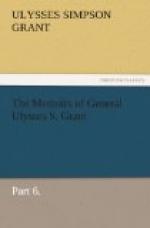General Sherman carried Missionary Ridge as far as the tunnel with only slight skirmishing. His right now rests at the tunnel and on top of the hill, his left at Chickamauga Creek. I have instructed General Sherman to advance as soon as it is light in the morning, and your attack, which will be simultaneous, will be in cooperation. Your command will either carry the rifle-pits and ridge directly in front of them, or move to the left, as the presence of the enemy may require. If Hooker’s position on the mountain [cannot be maintained] with a small force, and it is found impracticable to carry the top from where he is, it would be advisable for him to move up the valley with all the force he can spare, and ascend by the first practicable road.
U. S. GRANT,
Major-General.
(18) WASHINGTON, D. C., December 8, 1863, 10.2 A.M.
MAJ.-GENERAL U. S. GRANT:
Understanding that your lodgment at Knoxville and at Chattanooga is now secure, I wish to tender you, and all under your command, my more than thanks, my profoundest gratitude for the skill, courage, and perseverance with which you and they, over so great difficulties, have effected that important object. God bless you all,
A. LINCOLN,
President U. S.
(19) General John G. Foster.
(20) During this winter the citizens of Jo Davies County, Ill., subscribed for and had a diamond-hilled sword made for General Grant, which was always known as the Chattanooga sword. The scabbard was of gold, and was ornamented with a scroll running nearly its entire length, displaying in engraved letters the names of the battles in which General Grant had participated.
Congress also gave him a vote of thanks for the victories at Chattanooga, and voted him a gold medal for Vicksburg and Chattanooga. All such things are now in the possession of the government at Washington.
(21) WASHINGTON, D. C. December 29, 1863.
MAJ.-GENERAL U. S. GRANT:
General Foster has asked to be relieved from his command on account of disability from old wounds. Should his request be granted, who would you like as his successor? It is possible that Schofield will be sent to your command.
H. W. HALLECK
General-in-Chief.
(OFFICIAL.)
(22) See letter to Banks, in General Grant’s report, Appendix.
(23) [PRIVATE AND CONFIDENTIAL.]
HEADQUARTERS ARMIES OF THE UNITED STATES, WASHINGTON,
D. C.,
April 4, 1864.
MAJOR-GENERAL W. T. SHERMAN,
Commanding Military Division of the Mississippi.
GENERAL:—It is my design, if the enemy keep quiet and allow me to take the initiative in the spring campaign, to work all parts of the army together, and somewhat towards a common centre. For your information I now write you my programme, as at present determined upon.




